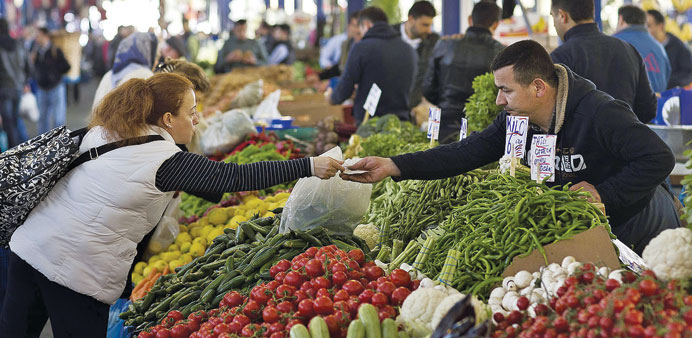A trader (right) collects lira banknotes from a customer at a stall in the Yesilkoy street market in Istanbul. Annual core consumer prices in Turkey rose 8.9% last month, data showed yesterday, driven in part by sharp falls in the lira.
Reuters/Istanbul
Core inflation in Turkey hit a 2015 peak in October, putting pressure on the central bank to tighten policy two days after President Tayyip Erdogan – who has equated high interest rates with treason – strengthened his hold on power.
Annual core consumer prices rose 8.9% last month, data showed yesterday, driven in part by sharp falls in the lira.
The central bank has so far this year steered clear of trying to support the currency by hiking rates, raising persistent market concerns about the institution’s independence.
Erdogan’s steadfast opposition to higher rates, together with renewed violence in the mainly Kurdish southeast and his crackdown on opposition media, are seen as major factors in this year’s 20% decline in the lira against the dollar .
Investors are now waiting to see whether Sunday’s unexpected outright parliamentary election win by the AK Party that Erdogan founded changes the fraught relationship between him and the bank.
Raising rates would put a floor under the lira, and economists say the bank’s monetary policy committee (MPC) cannot hold off doing so forever.
“It remains to be seen how much influence the new government will try to exert on monetary policy. But we continue to think that the MPC will raise interest rates over the next 3-6 months,” William Jackson of Capital Economics said in a note to clients.
Yesterday’s core inflation numbers – which exclude volatile food prices – were likely driven by the lira’s declines as well as deeper problems such as rapid wage growth and limited spare capacity, Jackson said. The lira and Turkish stocks rallied sharply on Monday, reflecting initial relief at the election result. Both succumbed to slight profit-taking yesterday. The year-on-year jump in core prices was the biggest since November 2014, when they advanced by 9%, the data from the Turkish Statistical Institute showed. Headline inflation, which includes food prices, slowed to 7.58%. On a monthly basis, the headline numbers quickened to 1.55%, exceeding an estimate of 1.35% in a Reuters poll.
In theory, Turkey’s return to single-party rule gives policymakers an opportunity to push ahead with long-neglected economic reforms, but success will depend on the shape of its new cabinet and whether Erdogan tries to intervene.
Analysts have voiced concern the outcome may embolden Erdogan, who has made fuelling growth his overriding economic objective. “The government will be back at the helm with no opposition in the way, which is good for decision-making but only if the decisions taken are the correct ones,” said Cristian Maggio, head of emerging markets strategy at TD Securities. “You will get political stability, but if you don’t have good policies, then government stability is useless.”

